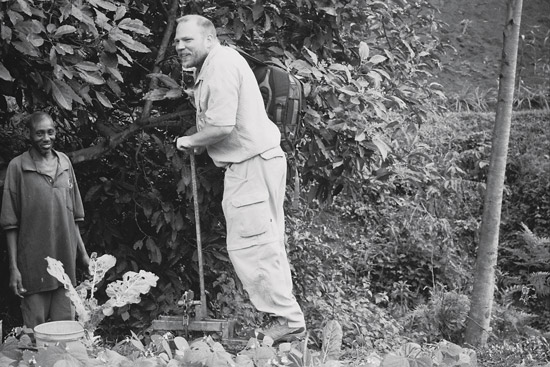Communications grad works to end poverty in Africa
Kenneth Weimar '90, demonstrates a manual irrigation pump to a farmer in Kenya.
Giving money to poor people doesn’t end poverty. The solution is providing people with a means of making money.
That’s the premise – and promise – of KickStart International, which is focused on improving living standards of poor people in Africa.
“We are fighting poverty in a whole new way,” explains Kenneth Weimar ’90 (professional and technical communications), director of development for the non-profit organization. “We’re using technology, the private sector, and the innate entrepreneurial spirit of the world’s poorest people.”
The concept is remarkably straightforward. KickStart develops and sells simple tools that enable people to increase their income. A prime example is a manual irrigation pump that allows farmers to grow larger and more valuable crops, even in dry times.
“The pumps look like Stairmasters, and that’s how they work,” says Weimar. Such devices make use of human resources – time and labor – that are abundant in many underdeveloped areas. “What we want to do is give people the ability to make more money from their sweat.”
KickStart was founded in Kenya in 1991 by Martin Fisher and Nick Moon, who both had worked for charitable organizations but had come to believe that traditional methods of fighting poverty were ineffective. Their alternative approach involves five steps: identify potential small business opportunities; design and develop simple technologies necessary to operate the businesses; train manufacturers to produce the technologies; promote and market the technologies; monitor the results to make sure they work.
“People ask why we don’t give the tools to people,” Weimar says. “There are a few reasons.” He notes that giveaways tend to be unfair – somebody has to decide who gets something. When items are sold in the marketplace, there’s no favoritism. In addition, jobs are created in manufacturing the tools, making the system more sustainable.
KickStart does, however, help cover the costs of starting the manufacturing process, helping to keep the tools affordable. Besides the irrigation pumps, KickStart has developed cooking oil presses, sanitation and building technologies, and others. Many of these have been invented by KickStart co-founder Fisher, an engineer with a Ph.D. in theoretical and applied mechanics from Stanford University.
The simple devices have had a big impact. KickStart has been remarkably successful, helping to start 50,000 new businesses, which now generate $52 million each year, by the organization’s reckoning. From its inception in Kenya, KickStart has expanded operations into Tanzania and Mali and is making efforts in several other nations. Headquarters are in San Francisco.
Weimar joined KickStart in 2005. “I went into fundraising the way most of us do,” he says. “By accident.”
As a student, he anticipated a career in marketing or advertising, but his first job after RIT was for Rochester’s Community Health Network. After three years, he moved to California and went to work for Community Counseling Services, the largest fundraising consulting firm in the world.
Weimar earned a master’s degree in non-profit administration from the University of San Francisco in 1998.
“The power and size of the non-profit sector is something people probably don’t think about,” he says. “It’s become a huge field, and tremendously diverse.”
Weimar says his work directly relates to what he learned in RIT’s communications program. “Fundraising really is about telling stories that are compelling and connecting with people.”
He knows that the KickStart story touches people on many levels. But there are challenges. In recent months, Kenya has been torn by violence that erupted after a disputed election.
“It’s been truly amazing that we have actually continued to sell pumps even in the heart of the most affected areas,”” says Weimar. “We take this as a positive sign. Kenyans are amazingly proud of their country and incredibly pragmatic. What we have heard the most is that people just want to get back to work.”
On his trips to Africa, he’s been tremendously impressed by the work ethic.
“The greatest untapped resource is the people,” Weimar says. “Everyone works so hard, but there are so few jobs
. “When people have the opportunity to lift themselves out of poverty, everything changes. They eat better. Their children go to school. They reinvest in their businesses and create more jobs.”
In that way, KickStart hopes to change the world – one pump at a time.














